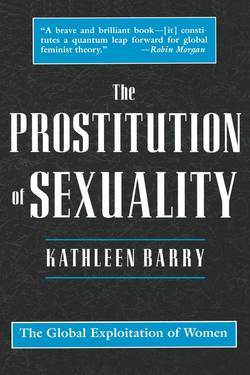Читать книгу The Prostitution of Sexuality - Kathleen Barry - Страница 10
На сайте Литреса книга снята с продажи.
What Then Is Rape?
ОглавлениеBeating, rape, and even murder are generally considered merely “occupational hazards” of prostitution. The Council for Prostitution Alternatives in Portland, Oregon, reported that of 179 women in their program who left prostitution in 1990-91, “seventy-eight percent of the survivors were the victims of rape, a class A felony. Almost half (48%) were raped by pimps an average of 16 times per year and more than three-quarters (79%) were raped by Johns an average of 33 times per year.20
In the prostitution world, the payment of money is the distinguishing factor that differentiates rape sex from prostitution sex. In women’s lives and experiences there is little distinction. In her WHISPER oral history project, Evelina Giobbe found that the prostitute woman “defined rape as a situation in which a customer had sex with her and then refused to pay or took back their money after the act.”21 Likewise in their study of 200 women and girls in prostitution in San Francisco, of the 73% who reported being raped while being prostitutes, Silbert and Pines found that in 19% of the cases the women tried to stop the rapist by telling him that she was a prostitute. By trying to return sex to economic exchange, the prostitute woman, rather than causing the rapist to withdraw, found that he escalated his attack. “They became furious at hearing the woman say she was a prostitute. Most started demanding she take back what she had said, insisting on taking her by force. In order to reassert their control, assailants then became extremely violent.”22
Silbert and Pines pointed out that “when the victim told the assailant she was a prostitute and offered him sexual gratification, she was trying to assert some contrql over the situation.” In comparison to those who did not tell, these women (12%) were subjected to more violent abuse. The rapists indicated in their behavior and words that they were directly involved with pornography.
In an effort to reduce accompanying beatings, the prostitute women offered sex that could be treated as if it were consensual, meaning sex to which they would not resist. The women distinguished rape sex from prostitution sex, not by the act, but by the payment of money. In the act of making the offer for prostitution exchange, the women behaved like bodied human beings who would willingly subordinate themselves to exploitation. This is the same condition that rape victims are in when they fight back and are told by their attacker to accept it or they will be hurt more or killed. As Silbert and Pines noted, the prostitute women were trying to assert control. But prostitution is sex bought on men’s terms. Rape is sex taken on men’s terms. The sex men buy in prostitution is the same sex that they take in rape—sex that is disembodied, enacted on the bodies of women who, for the men, do not exist as human beings. Men decide whether it is sex they pay for, or sex they take by force or with consent.
Rape of prostitute women has been a social enigma—not because prostitute women are not raped, for indeed they are, but because the experience of disembodied sex (in both rape and prostitution) has been reduced to issues of consent or of force. The prostitute women who offered consensual sex assumed that because they were sex, the commodity, by virtue of being prostitutes, offering sex would reduce the force. But both prostitution sex and rape sex are constructions of sex power. The prostitution of sexuality is the continuous reconfiguring of sex “on men’s terms” to sustain women’s subordination. In actuality, when a prostitute woman tries to assert sex divorced from rape, she defies one instance of sexual power—rape—to be subordinated in another instance—prostitution. That is why experientially rape and prostitution sex are undifferentiated for the women who are its vehicles. As one woman reported to Evelina Giobbe in her oral history project on women in prostitution,
Prostitution is like rape. It’s like when I was 15 years old and I was raped. I used to experience leaving my body. I mean that’s what I did when that man raped me. I looked up at the ceiling and I went to the ceiling and I numbed myself . . . because I didn’t want to feel what I was feeling. I was very frightened. And while I was a prostitute I used to do that all the time. I would numb my feelings. I wouldn’t even feel like I was in my body. I would actually leave my body and go somewhere else with my thoughts and with my feelings until he got off as it was over with. I don’t know how else to explain it except that it felt like rape. It was rape to me.23
